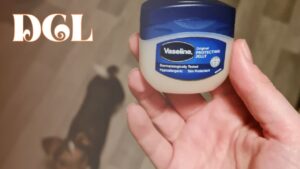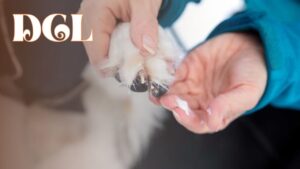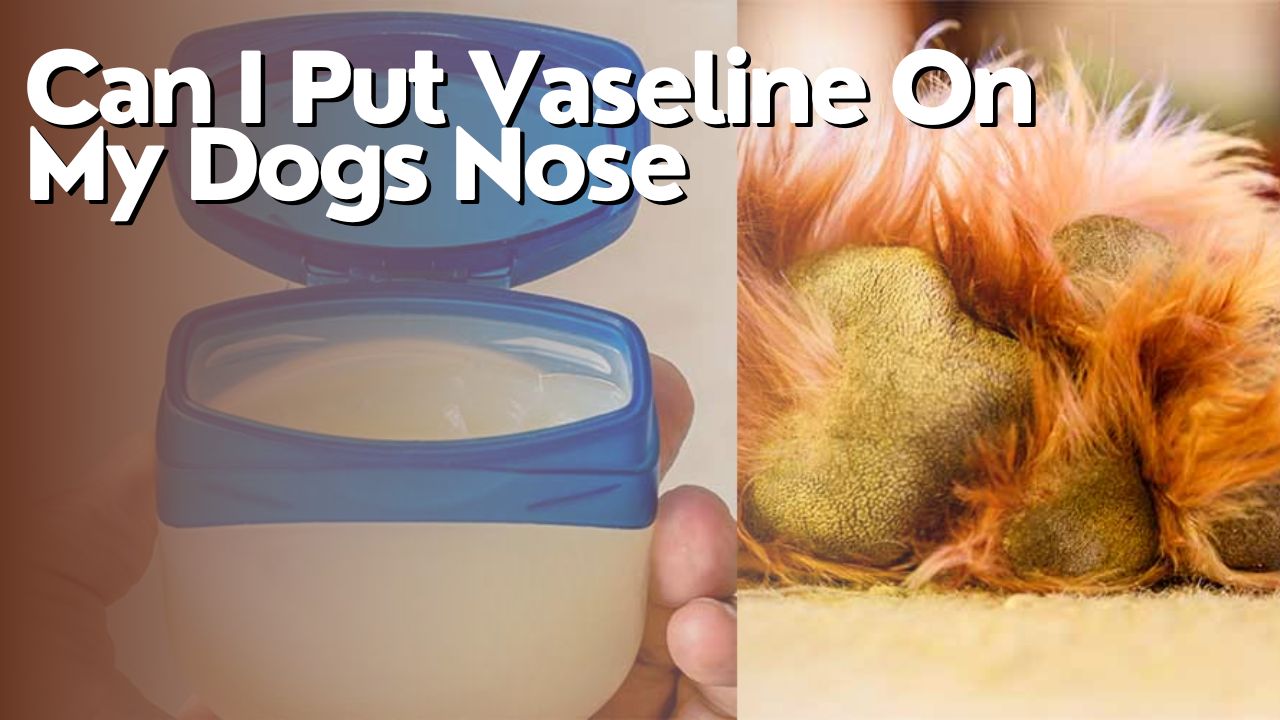Hey there! So, you might be wondering if it’s okay to put Vaseline on your dog’s nose. Well, I’ve got some answers for you.
As a dog owner myself, I understand how important it is to take care of our furry friends. Dry noses in dogs are quite common, and it’s natural to want to find a quick solution. However, it’s crucial to be well-informed before applying any products to our pets.
In this article, we’ll explore the causes of dry noses in dogs and discuss the potential risks of using Vaseline on your pup’s nose.
Don’t worry though, I won’t leave you hanging! We’ll also cover safe and effective alternatives for treating dry noses, as well as some helpful tips for preventing this issue in the first place.
And remember, when in doubt, it’s always a good idea to consult with a veterinarian for any nose-related concerns.
So, let’s dive in and find out if Vaseline is a good idea for your dog’s nose!
Understanding the Causes of Dry Noses in Dogs
You can’t always blame dry noses in dogs solely on dehydration. There are several other factors that can contribute to this condition.
One common cause is the weather. Just like humans, dogs can experience dry skin and noses during the colder months. The dry air can zap moisture from their delicate noses, causing them to become dry and cracked.
Another potential culprit is allergies. Dogs can be allergic to certain foods, environmental factors, or even certain grooming products. Allergies can cause inflammation and irritation, leading to a dry nose.
Additionally, certain medical conditions can also result in dry noses. For example, autoimmune diseases or hormonal imbalances can affect the moisture levels in a dog’s nose.
It’s important to identify and address the underlying cause of the dry nose to provide appropriate treatment. While vaseline can be used as a temporary solution to moisturize a dog’s dry nose, it’s best to consult with a veterinarian to determine the best course of action for your furry friend.

The Potential Risks of Using Vaseline on Your Dog’s Nose
Using Vaseline on your dog’s nose may pose potential risks that pet owners should be aware of.
One concern is the risk of ingestion and potential toxicity if your dog licks off the Vaseline.
Additionally, applying Vaseline to your dog’s nose may interfere with their natural moisturizing abilities, as it can create a barrier that prevents their skin from producing its own oils.
Possible ingestion and toxicity risks
Although it may be tempting to apply Vaseline on your furry friend’s nose, be cautious as there are potential ingestion and toxicity risks to consider. Dogs are known for licking their noses, and if they ingest Vaseline, it can lead to gastrointestinal upset such as vomiting or diarrhea. Additionally, Vaseline is not meant to be ingested and can cause a blockage in the digestive system if a large amount is consumed. Certain ingredients in Vaseline, such as petroleum jelly, can also be toxic to dogs if ingested in large quantities. To give you a better understanding of the potential risks, here is a table summarizing the ingestion and toxicity risks of using Vaseline on your dog’s nose:
| Risk | Description |
|---|---|
| Ingestion | Dogs may lick their noses and ingest Vaseline, leading to gastrointestinal upset. |
| Blockage | Ingesting a large amount of Vaseline can cause a blockage in the digestive system. |
| Toxicity | Certain ingredients in Vaseline, like petroleum jelly, can be toxic to dogs if consumed in large quantities. |
Interference with the dog’s natural moisturizing abilities
Applying petroleum jelly to your furry friend’s snout may interfere with their natural ability to keep their nose moisturized, leaving it vulnerable to dryness and discomfort. Dogs have a built-in system to maintain the moisture on their noses, which includes the production of natural oils.
When you apply Vaseline, it can create a barrier that prevents the nose from producing these oils, leading to dryness. Additionally, if the Vaseline is ingested, it can cause digestive issues and potentially lead to toxicity.
It’s important to remember that dogs have different needs than humans, and their noses are designed to function without the use of external moisturizers. If you notice your dog’s nose becoming dry or cracked, it’s best to consult with a veterinarian for appropriate treatment options.
Safe and Effective Alternatives for Treating Dry Noses in Dogs
There are safe and effective alternatives to treat dry noses in dogs. If you’re concerned about interfering with your dog’s natural moisturizing abilities by using vaseline, don’t worry! There are other options that can help keep your furry friend’s nose hydrated and healthy.
Here are some alternatives to consider:
- Coconut oil: This natural moisturizer can be applied directly to your dog’s nose. It not only helps hydrate the skin but also has antibacterial properties.
- Shea butter: This creamy substance is gentle on the skin and provides long-lasting moisture. It’s a great option for dogs with sensitive noses.
- Olive oil: Just a small amount of olive oil can go a long way in moisturizing your dog’s dry nose. Be sure to use extra virgin olive oil for the best results.
- Aloe vera gel: This soothing gel can help relieve dryness and irritation. Make sure to use aloe vera gel that is specifically made for pets, as some human products may contain ingredients that are harmful to dogs.
By incorporating these alternatives into your dog’s skincare routine, you can help keep their nose moisturized and healthy without relying on vaseline. Remember to consult with your veterinarian before trying any new products, especially if your dog has any pre-existing skin conditions.
Tips for Preventing Dry Noses in Dogs
To prevent dry noses in your furry companion, try incorporating these simple tips into their skincare routine.
First, make sure your dog stays hydrated by providing fresh water at all times. Dehydration can lead to dry skin, including their nose.
Additionally, consider using a humidifier in your home, especially during dry winter months, to add moisture to the air. This can help prevent dryness in your dog’s nose.
Another important tip is to avoid exposing your dog’s nose to harsh elements. Extreme temperatures, both hot and cold, can dry out their nose. If it’s hot outside, provide shade for your dog and avoid taking them for walks during the hottest parts of the day. In colder weather, consider using a dog-safe moisturizing balm on their nose to protect it from harsh winds and cold temperatures.
Regular grooming is also key in preventing dry noses. Keep your dog’s fur around their nose trimmed to prevent it from getting in the way and blocking their nose from natural moisturization. Additionally, gently wipe their nose with a damp cloth if you notice any dryness or crustiness.
By following these simple tips, you can help keep your dog’s nose moisturized and prevent dryness. Remember, a healthy nose is a happy nose!

When to Consult a Veterinarian for Nose-related Concerns
If your furry friend’s nose is showing signs of redness, swelling, or discharge, it’s time to consult a veterinarian. While some minor nose issues can be treated at home, more serious symptoms may require professional attention. A veterinarian can determine the underlying cause of the problem and recommend appropriate treatment options. They can also rule out any potential infections or allergies that could be causing the nose-related concerns.
There are a few specific situations where it is important to consult a veterinarian for nose-related issues. If your dog’s nose is consistently dry and cracked, it could be a sign of a more serious condition such as nasal dermatitis or autoimmune diseases. Similarly, if your dog’s nose is constantly running or has a persistent nasal discharge, it may indicate an infection or an allergic reaction. Additionally, if you notice any abnormal growths or lesions on your dog’s nose, it is essential to have them evaluated by a veterinarian to rule out any potential tumors or skin conditions.
Consulting a veterinarian for nose-related concerns is crucial to ensure the health and well-being of your furry friend. They have the expertise and knowledge to diagnose and treat various nose issues, providing the best care for your dog. So, if you notice any concerning symptoms, don’t hesitate to reach out to a veterinarian for guidance and assistance.
Frequently Asked Questions
Can I use Vaseline on my dog’s nose if it is severely dry and cracked?
Yes, you can use Vaseline on your dog’s nose if it is severely dry and cracked. However, it’s always best to consult with a veterinarian to ensure it’s the right course of action for your furry friend.
Is it safe to apply Vaseline on my dog’s nose if it has an open wound or sore?
It is not safe to apply Vaseline on your dog’s nose if it has an open wound or sore. It can potentially cause further irritation or infection. It’s best to consult a veterinarian for appropriate treatment options.
Will using Vaseline on my dog’s nose cause any allergic reactions or irritations?
Using Vaseline on my dog’s nose may cause allergic reactions or irritations. It’s important to consult a veterinarian to determine if it’s safe for my dog and to explore alternative options if necessary.
Can I use Vaseline on my dog’s nose if it has a history of skin allergies or sensitivities?
If my dog has a history of skin allergies or sensitivities, I would be cautious about using Vaseline on their nose. It’s best to consult with a veterinarian to find a suitable and safe alternative.
How frequently should I apply Vaseline on my dog’s nose to see improvement in dryness?
I should apply Vaseline on my dog’s nose frequently to see improvement in dryness.
Conclusion
In conclusion, it’s essential to prioritize the health and well-being of our furry friends. While it may seem convenient to use Vaseline on a dog’s dry nose, it’s best to avoid doing so due to potential risks.
Instead, opt for safe and effective alternatives recommended by veterinarians. Additionally, taking preventive measures, such as providing proper hydration and a balanced diet, can help maintain a healthy nose in dogs.
If any concerns persist, consulting a veterinarian is always the best course of action.


